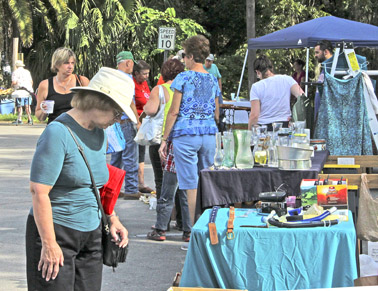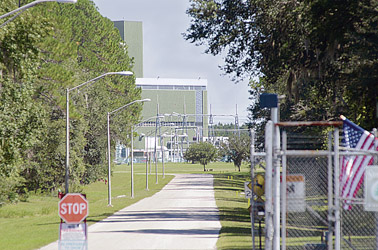
Shoppers look for deals at the sale. Vendors of all sizes and types were at the event, selling everything from antiques to arts and crafts to children's toys.
HIGH SPRINGS - Hundreds flocked to James Paul Park in High Springs Saturday morning, Oct. 5, to participate in the Chamber of Commerce Fall City-wide Yard Sale. There were vendors, big and small, from all over Alachua County there to try their hand at salesmanship.
The yard sale has been a fund-raising event for the chamber for over 10 years, as well as an opportunity for shoppers to find some deals. The event started at 9 a.m. and lasted until around noon.
Cheryl Thacker counted this as her fourth or fifth time running a table at the sale. Every year brings something new for her.
“One year, we had some scuba gear to sell and that was popular,” Thacker said. “Odd items and books interest people usually.”
There was no shortage of interesting objects on display at the yard sale this year, said Kelly Douglas, another vendor.
Douglas and her husband made a return to the event after missing the last few years. Their table mostly featured baby items, with some “knickknacks,” as she called them, thrown in. For them, it was a great opportunity to de-clutter their house, she said.
While Douglas looked to offload some of her kid’s old toys, Patti Bird was there to sell old things in general.
“We have a booth in a shop at Webb’s Antique Mall in Lake City,” Bird said. “An event like this is great for showing people what we have and creating some buzz for business.”
Bird and her husband had several small antique tables with them, as well as other furniture up for sale. This was their second year attending the event, one they really try to enjoy, she said.
“Everyone is really friendly coming around, and we always take a couple of laps around throughout the day to see what we can find as well,” Bird said.
While there were some veteran vendors set up once again for the yard sale, some took in the atmosphere Saturday for the first time. Among these was one Bryce Ware, an 8-year-old looking to capitalize on this financial opportunity.
Melissa Ware, Bryce’s mother, oversaw the operation of their table. The yard sale was something her son was incredibly excited about, she said. It was his idea to get the family to come.
“This is our first time coming out and selling at the yard sale,” Ware said. “My son urged us to, and really is the brains behind the whole thing.”
Bryce was looking to get rid of some of his older toys and such so that he could finance the purchase of a new Nintendo DS videogame.
When Bryce wanted to get the new game, she told him, “You can get it, but you’re going to have to buy it with your own money.”
Bird and Douglas each took their own turn at checking out other people’s booths, but Thacker and Ware weren’t as interested.
“I probably won’t walk around too much,” Ware said.” My husband and son are out looking at things now, but I’m not much of a gatherer.”
Thacker felt the same, but said her husband was the opposite.
“He’s probably been around five times already this morning,” she said.
Kelly Douglas was looking to possibly find some toys and knew the yard sale would be a great chance for her and others as well.
“It’s hard to buy new these days,” she said. “If someone can find something they will use and love, then it’s great. Besides, it is nice to see everyone from the city here and it turned out to be a gorgeous day.”
# # #
Email ahart@
alachuatoday.com
1 Comment


